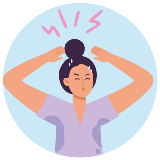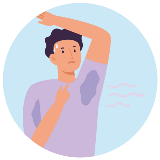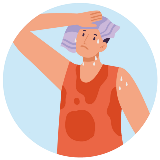Healthy Living
Eight Things To Know About Sweat
Sweating is the natural cooling reaction of the body to prevent it from overheating. Our bodies have two to four million sweat glands. When the body overheats, the glands release water to the skin's surface. And the cooling happens when the water evaporates.
Warm temperature is the most common trigger for sweating, but there are more sweating factors than we know.
The ‘No-Sweat’ Facts
 Sweating while exercising comes with benefits Sweating while exercising has many benefits such as boosting energy, maintaining a healthy weight, improving mood and promoting good sleep. |
 You sweat when having bursts of emotions Sweating can also result from anger, fear, embarrassment, anxiety and stress. |
 You sweat when eating certain foods You can also sweat when eating spicy food, caffeinated drinks and alcoholic drinks. This type of sweating is called gustatory sweating. |
 Sweating does not flush toxins out of the body Sweat consists of 99% water and the rest is a combination of ammonia, urea, salt and sugar. Most of the detoxing still occurs in the liver and kidneys. |
 Body odor does not come with sweating Sweat is mostly water so it doesn’t smell, but when sweat produced in the apocrine glands is mixed with bacteria or hormone secretions, that’s when sweat will start to develop an odor. |
Cause for Concern
 Hyperhidrosis is the medical term for excessive sweating Excessive sweating means sweating even when there is no overheating of the body to be cooled down. It can also mean the sweating gets in the way of doing daily activities such as turning a doorknob or when sweat soaks through clothes. |
 Hypohidrosis is the medical term for the inhibited ability to sweat Not sweating or sweating less can be dangerous and may lead to heat stroke, which is a life-threatening condition. This is caused by various factors such as nerve damage, skin conditions, genetics and may be a side effect of certain medications. |
 Sweat or odors may impact health If you feel like you’re sweating more or less than normal, notice that your sweat is smelling different than normal or impacts your professional and personal life, please consult a doctor for proper diagnosis and treatment. |
Sources:
Everyday Health
Medling Plus
National Institutes of Health
American Academy of Dermatology Association
Healthline
International Hyperhidrosis Society
Sign Up for Health Tips
Get our advice and upcoming events about weight, pain, heart and more.
Take a Health Risk Assessment
Our health assessments can help you identify issues and areas to discuss with your doctor.


